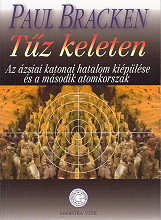
BRACKEN : Tűz keleten (ajánló)
Whether one feels that the United States involvement in Vietnam was an aberration of our general policy or was in fact a sign of the future, one cannot help but wonder regarding its impact on the military establishment. It is perhaps too soon after the event to attempt definitive analyses; nevertheless, the U.S. military is faced with problems that crystallized during the Vietnam period, and perhaps because of it, require immediate response. The anti-military sentiments in society, a general decline of the prestige of the military, a growing restiveness within the professionals—all of these are issues which need to be faced now.
A new international environment is also evolving, partly as a result of the end of the U.S. ground role in Vietnam and partly as a result of the end of the Cold War mentality. In any case, this has added to the difficulties encountered by the U.S. military in adapting to the post-Vietnam era.
The end of the Vietnam War and the new international order have had some immediate impact on the military establishment—the all-volunteer military, for example. There are, of course, many others involving force postures, combat capability. weapons procurement, and security policy in general. A number of scholars have addressed these issues and continue to do so. But it is unusual to have regular military men seriously consider such matters in the public forum.
This hook is written two West Point graduates, both having served in and both having given serious consideration to the nature of the post-Vietnam military establishment. They have published articles in professional journals addressing the issues of the U.S. Army in Vietnam and its role in national security. Although all the services have similar problems, the U.S. Army has the greatest, perhaps because of its ground role its involvement in overseas bases, and its past dependence on the selective service system. The authors, applying their academic background combined with professional experience, are able to integrate the theoretical with the practical and bring sofme useful and thought-provoking insights into the nature of the U.S. Army in transition during the post-Vietnam era. In so doing, they present a range of alternatives for dealing with the post-Vietnam period. Whether one agrees with their assessments and recommendations is not as important as recognizing that these are being presented by active regular Army officers—in itself a unique event. Their analyses, assessments, and conclusions regarding the U.S. involvement in Vietnam and the kinds of security policies and military establishment that should be developed reveal interesting insights into professional values and perceptions. The authors represent a new breed of army officers—those who are well grounded in intellectual processes and not afraid to articulate their assessments in these terms.
The publication of this volume has been undertaken by the Inter-University Seminar on Armed Forces and Society, not because of the specific content and views it contains. Rather it is felt that the volume represents a worthwhile contribution to the understanding and study of the role of the military in our society. The mode of analysis and the conclusions are not necessarily shared by the Fellows of the Inter-University Seminar. The Inter-University Seminar on Armed Forces and Society is composed of over three hundred social scientists with academic and scholarly commitments whose interests cover a wide range of subjects within the area of armed forces and society. The fellows of the Inter-University Seminar hold a wide range of policy views but they are all concerned with intellectual and academic analysis of military institutions as they undergo change. In this respect the Inter-University Seminar provides a framework and focal point through which intellectual interchange can be fostered, research stimulated, and studies published.
—Sam C. Sarkesian
Chicago, Illinois
1973